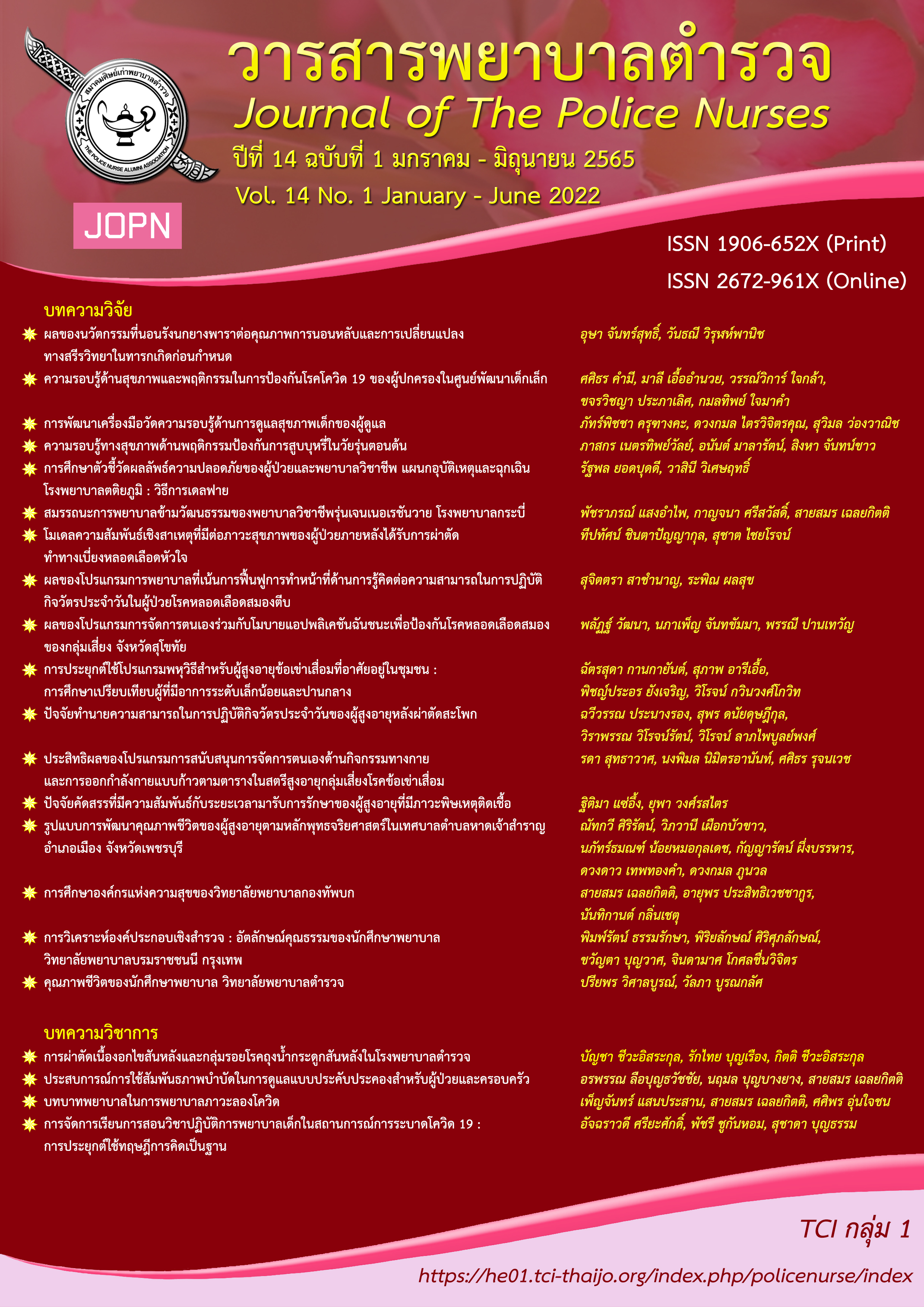THE DEVELOPMENT MODEL OF THE QUALITY OF LIFE FOR THE ELDERLY BASED ON BUDDHIST ETHICS IN HADCHAOSAMRAN SUBDISTRICT MUNICIPALITY, MUANG DISTRICT, PHETCHABURI PROVINCE
Keywords:
quality of life, elderly, Buddhist ethics, four noble truthAbstract
The objectives of this research were 1) to study the problem of the quality of life for the elderly in Hadchaosamran Subdistrict Municipality, 2) to study the level of the development model of the quality of life, and 3) to propose the development model of the quality of life for the elderly base on Buddhist ethics in Hadchaosamran Subdistrict Municipality, Maung District, Phetchaburi Province. This research was a mixed method with a sample group consisting of 271 people aged more than 60 years in Hadchaosamran Subdistrict Municipality, and 9 elderly representatives in Hadchaosamran Subdistrict Municipality. The data were collected by using an elderly quality of life questionnaire and a structured in-depth interview, tested by 3 experts, the conformity index was .67-1.00 and the reliability of the whole questionnaire was .968. The data were analyzed by using frequency, percentage, mean, standard deviation, and content analysis.
The research results were as follows: 1) The elderly in Hadchaosamran Subdistrict Municipality had deteriorated physical health, were unhealthy, and suffered from various diseases, causing limitations for the body to live resulting in the inability to do a normal job. These drawbacks negatively affected their mental state making them feel low on themselves, be a burden on their family, and feel unimportant, which decreased their roles in their family and society and led to stress from self-altering conditions and delays in perception, memory, and learning; 2) The development model of the quality of life for the elderly based on Buddhist ethics was overall at a high level (M = 3.83, SD = .41). The component with the highest mean was suffering (M = 3.95, SD = .53), and the least was the noble eightfold path, (M = 3.67, SD = .49). Moreover, the quality of life in 4 aspects of the elderly was overall at a high level (M = 3.68, SD = .40). The component with the highest mean was mental (M = 3.89, SD = .51), and the least was physical (M = 3.42, SD = .51); and 3) The development model of the quality of life for the elderly based on Buddhist ethics in Hadchaosamran Subdistrict Municipality, Maung District, Phetchaburi Province was the “BPHV Model” format with the following components: cognition building, participation, health promotion, and value creation.
Downloads
References
Chotiyano, S. (2019). Personal growth according to the four noble truths of the aging in the Wat Chaichimplee community in Bangkok. Phra Nakhon Si Ayutthaya: Mahachulalongkorn rajavidyalaya University.
Hadchaosmran Subdistrict Municipality. (2021). List of pension recipients 2020. Received from http://www.hadchaosamran.go.th/assets-dmin/files/welfare/44457970475949.pdf
Institute for Population and Social Research, Mahidol University. (2014). Situation of the Thai elderly 2014. Bangkok: Amarin Printing and Publishing.
Jaemtim, N., Yuenyong, S., & Srisodsaluk, P. (2015). Effects of preparation to care for elderly program at Sanamchai subdistrict, Mung district, Suphanburi province. Nursing Journal of the Ministry of Public Health, 25, 108-119.
Kittivanno, T. (2018). Analysis of the quality of life development of the elderly in the context of the dharma of the elderly school Wiang subdistrict Administrative Organization, Fang district, Chiang Mai province. Journal of MCU Humanities Review, 4, 245-252.
National Statistical Office. (2021). Demographic statistics, population and housing, project year 2020. Received from http://phetburi.old.nso.go.th/nso/ project/search/result_by_department.jsp
Phra Phromkunakorn (P. A. Payutto). (2013). Buddha Dharma, amended edition (35th ed.). Bangkok: Pallitham Publishing House, A Subsidiary of Pet and Home.
Prodbumrung, J., Leeka, J., & Thongpan, S. (2016). Health care for the elderly, according to the buddhist ethics. Buddhachinaraj Medical Journal, 33, 233-240.
Saengsuk, S. (2021). Development of quality of life according to Buddhism. Received from http://www.phd.mbu.ac.th/index.php/2014-08-28-08-57-4/79-2014-09-11-03-48-21
Sonnoi, A. (2017). The development model for elders’ quality of life in Buriram province. Buriram: Buriram Rajabhat University.
Yamane, T. (1973). Statistics: An introductory analysis. (3rd ed.). New York, NY: Harper and. Row.
Thai Health Promotion Foundation. (2013). Quality of work life and happiness. Bangkok: Thammada.
Thanontaro, S. (2014). Understanding of life according to the four noble truths of teachers in municipal schools 5, Phra Pathom Chedi Temple, Muang district, Nakhon Pathom province. Bangkok: Thongsook College.
WHOQoL Group. (1994). The development of the World Health Organization quality of life assessment instrument (the WHOQOL). In Quality of life assessment: International perspectives (pp. 41-57). Springer, Berlin, Heidelberg.
Downloads
Published
How to Cite
Issue
Section
License
Copyright (c) 2022 JOURNAL OF THE POLICE NURSES

This work is licensed under a Creative Commons Attribution-NonCommercial-NoDerivatives 4.0 International License.
ผลงานที่ได้ตีพิมพ์แล้วจะเป็นลิขสิทธิ์ของวารสารพยาบาลตำรวจ















